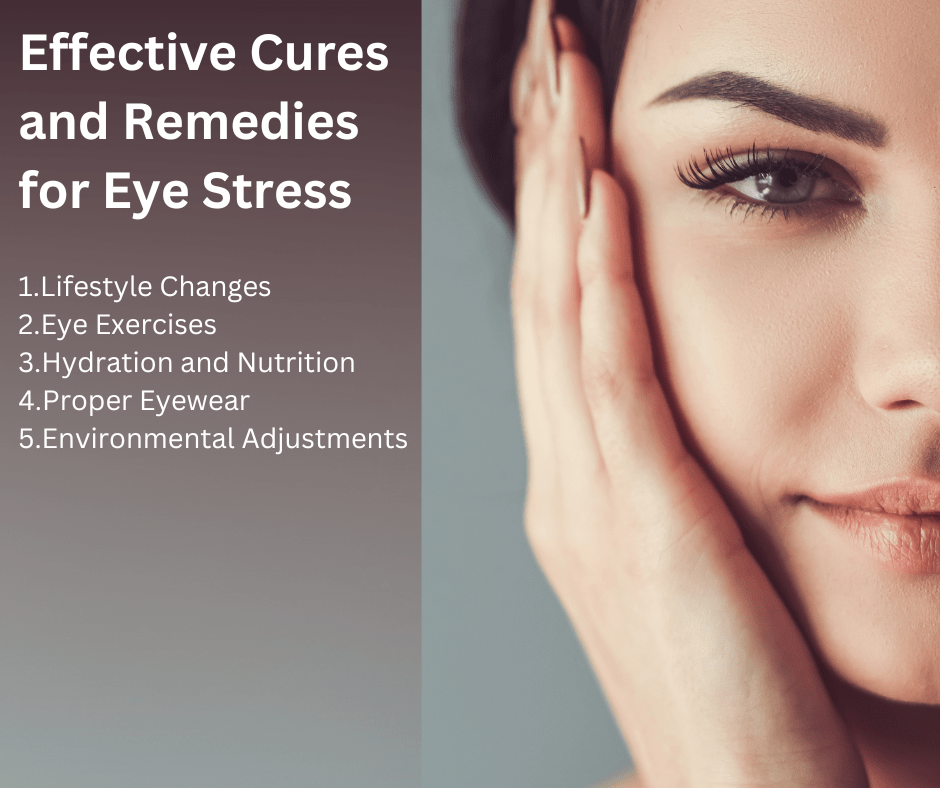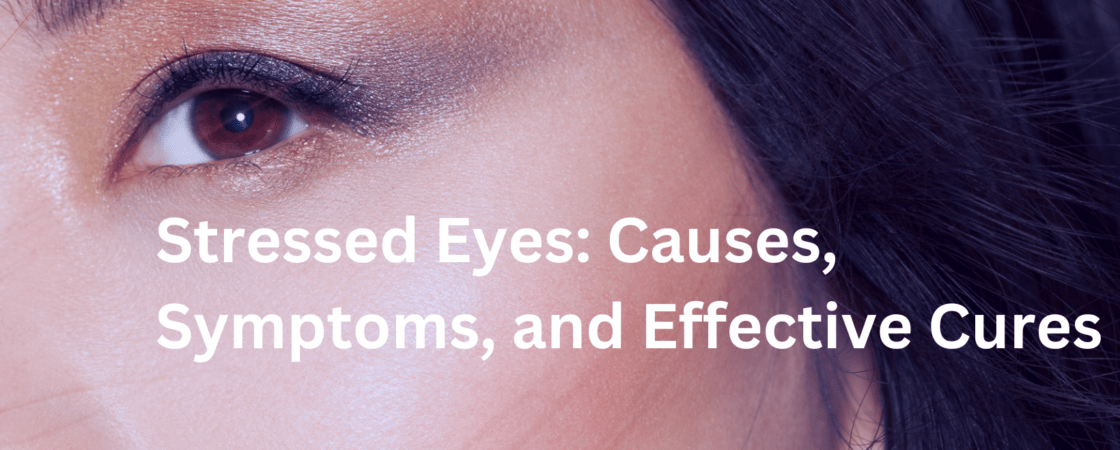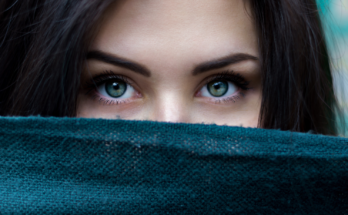
Introduction
Brief Overview of the Importance of Eye Health
Our eyes are one of the most vital organs, allowing us to perceive the world around us. Maintaining good eye health is crucial for overall well-being and quality of life. Neglecting eye care can lead to various issues, including eye stress, which can significantly impact daily activities.
Introduction to the Concept of Eye Stress
Eye stress, also known as eye strain or asthenopia, occurs when the eyes become tired from intense use. This condition is increasingly common in our digital age, where prolonged screen time and other factors contribute to eye discomfort.
Importance of Addressing Eye Stress Promptly
Ignoring eye stress can lead to more severe problems, such as chronic headaches, vision problems, and decreased productivity. Addressing eye stress promptly ensures that your eyes remain healthy and functional.
What is Eye Stress?
Definition of Eye Stress
Eye stress is a condition characterized by discomfort and fatigue in the eyes, often resulting from prolonged use or exposure to certain environmental factors. It is not a disease but a symptom that indicates the eyes are overworked.
Common Causes of Eye Stress
- Prolonged Screen Time: Spending long hours in front of computers, smartphones, or tablets can strain the eyes.
- Poor Lighting Conditions: Insufficient or harsh lighting can make it difficult for the eyes to focus, leading to stress.
- Reading Without Breaks: Continuous reading without adequate breaks can tire the eye muscles.
- Incorrect Prescription Glasses or Contact Lenses: Using the wrong prescription can force the eyes to work harder, causing stress.
- Environmental Factors: Dry air, pollution, and exposure to bright lights can contribute to eye stress.
Symptoms of Eye Stress
Detailed Description of Symptoms
- Eye Fatigue: A feeling of tiredness in the eyes, often accompanied by a need to close them.
- Blurred Vision: Difficulty in seeing clearly, especially after prolonged use of the eyes.
- Headaches: Pain in the head, often around the eyes and temples.
- Dry or Watery Eyes: Eyes may feel dry and gritty or excessively watery.
- Sensitivity to Light: Increased sensitivity to light, causing discomfort.
- Difficulty Focusing: Trouble in maintaining focus on objects, especially after extended periods of concentration.
Diagnosing Eye Stress
How to Recognize the Signs Early
Early recognition of eye stress symptoms is crucial. Pay attention to any discomfort or changes in vision, especially after activities that require intense eye use.
When to Consult an Eye Care Professional
If symptoms persist despite taking breaks and making adjustments, it is essential to consult an eye care professional. Persistent eye stress can indicate underlying issues that need medical attention.
Common Diagnostic Tests
- Visual Acuity Test: Measures the clarity of vision.
- Refraction Assessment: Determines the correct prescription for glasses or contact lenses.
- Slit-Lamp Examination: Allows a detailed examination of the eye’s structures.
Effective Cures and Remedies for Eye Stress

1. Lifestyle Changes
- Importance of Regular Breaks (20-20-20 Rule): Every 20 minutes, take a 20-second break and look at something 20 feet away.
- Proper Lighting and Ergonomics: Ensure adequate lighting and maintain a comfortable distance from screens.
- Adjusting Screen Brightness and Contrast: Match screen brightness to the surrounding environment.
- Using Anti-Glare Screens and Blue Light Filters: Reduce glare and blue light exposure to minimize eye strain.
2. Eye Exercises
- Palming Technique: Rub your hands together to generate heat and place them over your closed eyes for a few minutes.
- Eye Rolling: Roll your eyes in a circular motion to relax the eye muscles.
- Focus Change Exercise: Shift focus from a near object to a distant one to reduce strain.
- Blinking Exercises: Blink frequently to keep the eyes moist and reduce dryness.
3. Hydration and Nutrition
- Importance of Staying Hydrated: Drink plenty of water to maintain eye moisture.
- Foods Rich in Vitamins A, C, and E: Include carrots, spinach, and citrus fruits in your diet.
- Omega-3 Fatty Acids and Their Benefits: Consume fish, flaxseeds, and walnuts to support eye health.
4. Proper Eyewear
- Importance of Correct Prescription Glasses: Ensure your glasses or contact lenses are up-to-date.
- Benefits of Computer Glasses: Use glasses designed to reduce screen glare and blue light exposure.
- Contact Lens Care Tips: Follow proper hygiene and care routines for contact lenses.
5. Environmental Adjustments
- Using Humidifiers: Maintain adequate humidity levels to prevent dry eyes.
- Reducing Exposure to Pollutants: Minimize exposure to smoke, dust, and other irritants.
- Maintaining a Clean and Dust-Free Environment: Regularly clean your living and working spaces.
Medical Treatments
- Over-the-Counter Eye Drops : Lubricating eye drops can provide relief from dryness and irritation.
- Prescription Medications : In some cases, doctors may prescribe medications to address underlying issues causing eye stress.
- When to Consider Surgery: Surgery is rarely needed for eye stress but may be considered for underlying conditions like severe dry eye syndrome.
Preventive Measures
- Regular Eye Check-Ups : Schedule regular visits to an eye care professional to monitor and maintain eye health.
- Adopting a Healthy Lifestyle :Incorporate a balanced diet, regular exercise, and adequate sleep to support overall eye health.
- Educating Oneself About Eye Health : Stay informed about eye health and adopt practices that promote long-term well-being.
Conclusion
- Recap of the Importance of Addressing Eye Stress : Addressing eye stress is essential for maintaining good vision and overall quality of life.
- Encouragement to Adopt the Suggested Remedies : Implementing the suggested lifestyle changes, exercises, and preventive measures can significantly reduce eye stress.
Final Thoughts on Maintaining Long-Term Eye Health
Prioritize eye health by adopting healthy habits and seeking professional advice when needed. Your eyes are invaluable, and taking care of them ensures a clearer, more comfortable future.
Frequently Asked Questions
What symptoms indicate that my eyes are stressed?
Symptoms of stressed eyes include blurry vision, eye strain, headaches, dry eyes, eye twitching, and sensitivity to light.
How does stress affect eye health?
Stress can increase intraocular pressure, leading to conditions like glaucoma. It can also cause eye strain, dry eyes, and even temporary vision changes.
Can prolonged screen time cause eye stress?
Yes, prolonged screen time is a major contributor to eye stress, leading to digital eye strain or computer vision syndrome.
What are some effective cures for stressed eyes?
Effective cures include taking regular breaks (20-20-20 rule), using artificial tears, adjusting screen brightness, and practicing good posture.
How can I prevent eye strain from digital devices?
To prevent eye strain, reduce screen time, use blue light filters, maintain proper screen distance, and ensure adequate lighting.
Are there any exercises to relieve eye stress?
Yes, eye exercises like focusing on distant objects, blinking frequently, and palming can help relieve eye stress.
Can stress-related eye problems lead to permanent damage?
Chronic stress can lead to serious eye conditions like glaucoma and macular degeneration if not managed properly.
When should I see a doctor for stressed eyes?
If you experience persistent symptoms like severe eye pain, vision loss, or frequent headaches, it’s important to consult an eye doctor.
What lifestyle changes can help reduce eye stress?
Lifestyle changes such as reducing screen time, improving sleep quality, managing stress, and maintaining a healthy diet can significantly reduce eye stress.
-
Can chilly weather cause illness? Your grandmother wasn’t completely mistaken.
Grandma’s advice about the dangers of walking barefoot on a cold floor or stepping outside with wet hair holds some validity.
-
Biden aims for Medicare and Medicaid to include expensive weight-loss medications like Wegovy in their coverage.
The Biden administration aims to broaden access to anti-obesity medications for millions of individuals on Medicare and Medicaid.
-
5 Ways R.F.K. Jr. Could Undermine Lifesaving Childhood Vaccines
If he is confirmed as H.H.S. secretary, the longtime vaccine critic would be in a position to change the government’s immunization recommendations and delay the development of new vaccines.. For …
-
Pancreatic Cancer Surge May Be Less Worrisome Than It Seemed
A rise in the disease in younger people was not followed by an increase in deaths, a study found, and might be a sign of overdiagnosis.. One of the first …
-
POTS and Sjögren’s syndrome: Autoimmune conditions that impact millions of people in the United States.
Millions of Americans, primarily women, endure the symptoms of autoimmune diseases, some of which can be chronic and potentially life-threatening.
-
Eye Strain No More: Discover the Best Exercises for Digital Detox
” Discover effective exercises and tips to relieve screen-related eye strain. Learn about the 20-20-20 rule, eye yoga, distance shifting, ergonomic adjustments, and more to reduce discomfort from prolonged screen …





